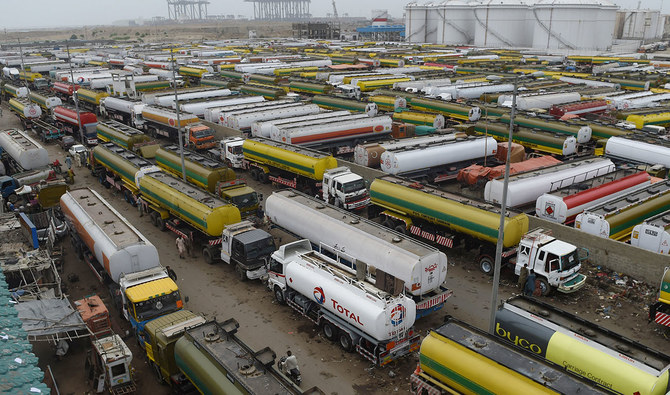KARACHI: Cash-strapped Pakistan’s Petroleum Division has moved a summary to the Economic Coordination Committee (ECC)--the country’s top economic decision-making body— to import energy products worth $220 million from Azerbaijan, an official confirmed on Thursday.
Pakistan has been striving to clinch favorable energy deals from various countries in an attempt to cut down its whopping import bill of gas and petroleum products which surpassed $23 billion during the last financial year.
With alarmingly low foreign reserves, the country is out of the LNG spot market since June 2022, firstly due to skyrocketing prices of energy products and secondly, due to its fast-depleting forex reserves.
Islamabad and Baku this week held talks to materialize two credit lines worth around $220 million to import petroleum products and LNG under government-to-government (G2G) arrangements, the official added.
“The [Pakistani] delegation has arrived back and we have moved a summery to the ECC for the approval for imports from Azerbaijan. After approval, it would be operationalized,” a Petroleum Division official privy to the development told Arab News on condition of anonymity.
The official said Pakistan has requested Azerbaijan for the credit lines facility and is awaiting response while the ECC’s approval is expected within this month.
The State Oil Company of the Azerbaijan Republic (SOCAR) will arrange for the credit lines it offered to Pakistan back in 2016, with local banks and financers, the official shared. Credit lines worth $120 million for LNG and $100 million for oil imports are expected from SOCAR.
The proposal under discussion will also allow the country to avail the deferred payment facility for 60 days, he added.
In August 2022, LNG spot prices soared to a record high of $69.9 per million British thermal units (mmBtu) for Asia after the Russian invasion of Ukraine and subsequent supply chain disruptions in Europe.
However, prices have dropped by around 40 percent since January as demand remains weak. Last week , the average LNG price for the April delivery was $16 per mmBtu for Asian deliveries, which further dipped to $14.6 per mmBtu on February 20, 2023.
Pakistan meets more than half of its LNG requirements through long-term import contracts while it meets gaps in demand through spot cargo purchases. Islamabad has long-term agreements with Gunvor and ENI— multinational commodity and energy trading companies— for the supply of an LNG cargo every month.
Energy officials have said the country is not in a position to resort to the LNG spot market due to its current financial crunch, despite a significant cut in prices in the global market.
The average import bill of Pakistan for the first seven months of the current fiscal year (FY23) remained over $5 billion while the country’s state bank has reserves of only $3.1 billion left.
Pakistan has restricted imports to prevent the outflow of dollars, slowly clearing cargo at the ports as banks delay or deny opening of Letters of Credits (LCs) for importers.
Petroleum sector experts say the import of petroleum products, given Pakistan’s current economic climate, is good news that will provide the country— already low on forex reserves— some breathing space.
“Under the current economic situation of Pakistan, the import of oil from Azerbaijan is a welcome move that the country desperately needs,” Tahir Alam, general secretary of the Petroleum Club of Pakistan, told Arab News.
“However, it still remains to be seen at what terms and conditions the imports will be materialized and how beneficial it would be for Pakistan in the long term.”
Under the credit line for the petroleum products, the country is negotiating for the import of at least two cargos of Mogas (motor gasoline) a month through the state-owned Pakistan State Oil (PSO), the official said.












